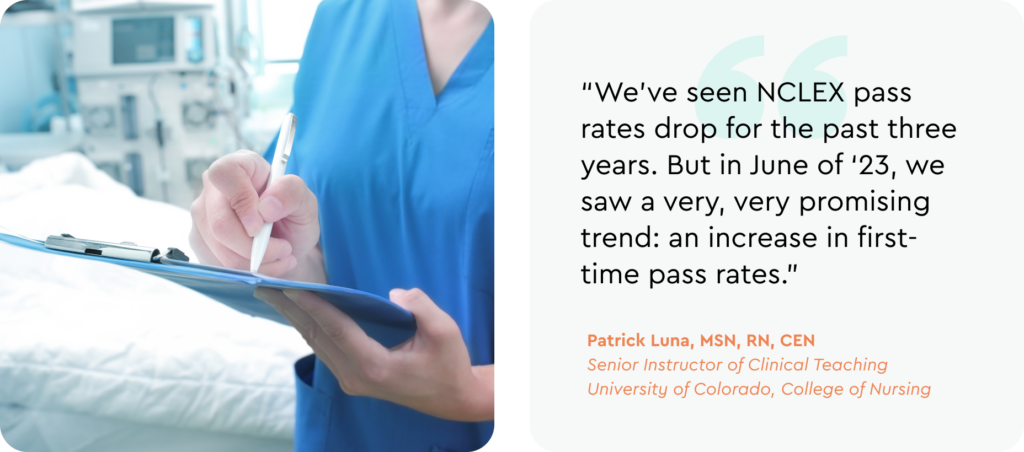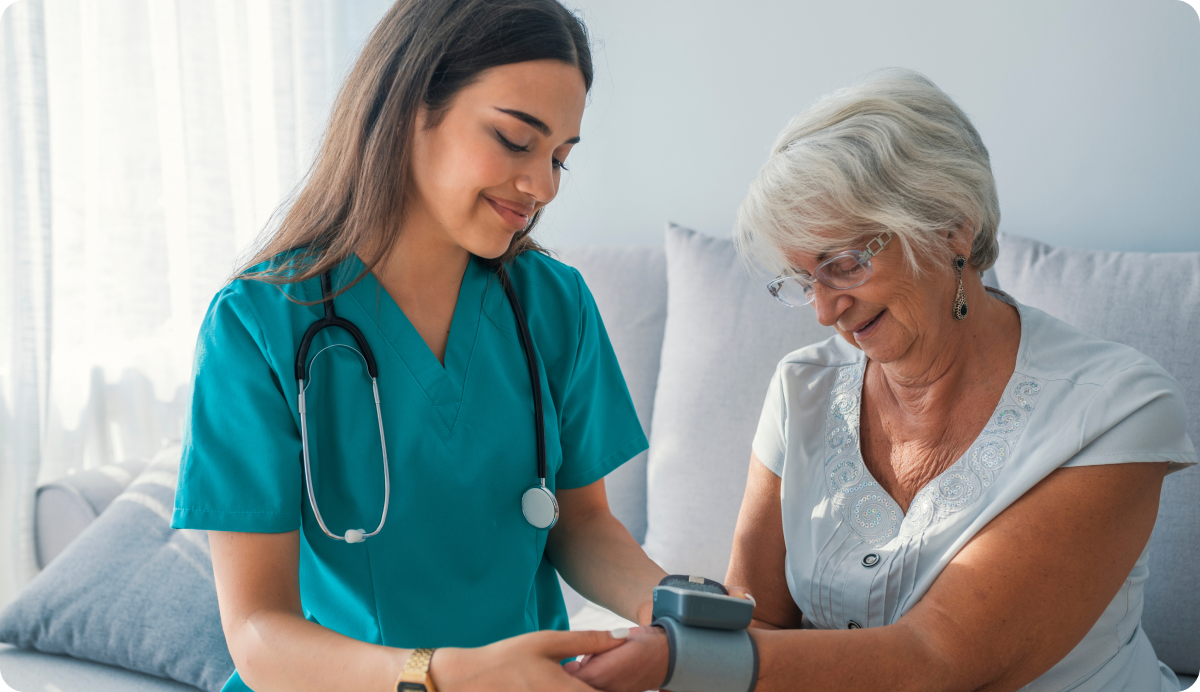The world of nursing education has been in a state of transition, particularly with the introduction of the new NextGen NCLEX exam. This shift has prompted educators and institutions to reevaluate how they prepare nursing students for their careers. Recently, GoReact hosted a webinar that delved into the initial results from the new NCLEX and the evolving landscape of nursing education. Here, we recap key insights from the interview between GoReact and Patrick Luna, a Senior Instructor at the University of Colorado College of Nursing in Aurora, Colorado. You can read through the highlights below or watch the entire webinar here.
Results are in! What are you seeing?
“The past three years have been an emotional time for educators,” Patrick Luna begins. “We’ve seen NCLEX pass rates drop for the past three years. But in June of ’23, we saw a very, very promising trend: an increase in first-time pass rates. It leaped up by almost 14%, and that’s compared to the first three months of 2023. So we saw quite a drastic leap in first-time pass rates, which was really, really good news.
The first-time pass rate was almost 94% for our students that took the new NextGen NCLEX. We’re pleasantly surprised and hope that we’re going to be able to maintain this. In 2022, we saw NCLEX pass rates drop as low as 79%. So we’re hoping this new trend maintains, but this was good news to start off with.”

What’s changed to start an upward trend?
Luna explains, “We worked really hard as a nursing education community to prepare our students better for practice and for this exam, and there were a few factors involved.
- Coming out of COVID, we’ve become very used to the way that we’re educating our students now. There’s a sense of normalcy coming out of that period, so that’s a promising trend growing forward.
- The success can also be attributed to a change in the [learning] environment.
- We have a vision for nurses who are better prepared for practice; that’s been the goal all along.
We need to maintain that momentum and to maintain those changes in our educational environment and even implement more.”
What is clinical judgment and why is it important?
Clinical judgment is a vital component of nursing practice. It involves the ability to make sound decisions, assess situations, and determine the best course of action in clinical settings. Clinical judgment is not just about acquiring knowledge; it’s about applying that knowledge in real-world scenarios, which is crucial for nurses as they transition to practice. But effectively evaluating if a nurse is real-world ready is a challenging and complex process.

What can nursing instructors do to build clinical judgment skills?
Luna suggests that nursing instructors can adopt innovative evaluation methods to foster clinical judgment skills. He emphasizes that much of the necessary groundwork is already in place, but there’s room for improvement in evaluation methods, especially in the didactic setting. Luna mentions how GoReact can be a game-changer in this regard.
“I serve in both didactic and clinical roles,” he says. “The clinical roles have been doing this type of work for a long time, and it’s just because this is how they evaluate in that area is real-world, real-life, and how that directly translates to practice. So the didactic setting is where we need to flip our script when it comes to evaluation.”
He continues, “We can be more innovative in how we evaluate by using a tool like GoReact because of the tool’s ability to provide formative and summative feedback. One way I use it is I take an assignment’s information, put it on my Canvas LMS, and then the evaluation aspect of it, I put into GoReact. So I upload the rubric, and instead of this being a written assignment or something that the students would do in a simulation space, I have them record their responses in GoReact as if they were talking to a patient.”
Using GoReact, instructors can assess not just the content but also the non-verbal communication and other critical aspects of a student’s interaction with a patient. It allows pinpointed feedback, enabling students to focus on areas for improvement, making the evaluation process richer and more comprehensive.

GoReact can better prepare nurses for practice
Throughout the webinar, Patrick Luna highlights the importance of shifting our focus in nursing education to teach and evaluate what students can do rather than what they know. The new NextGen NCLEX emphasizes clinical judgment and practical skills, and GoReact is a valuable tool to aid in this transition.
If you want to dive deeper into the discussion and hear other ways Luna uses GoReact with his nursing students, we encourage you to watch the complete webinar. Hopefully you’ll gain a more comprehensive understanding of how nursing education is evolving to better prepare nurses for their careers in today’s healthcare industry.









